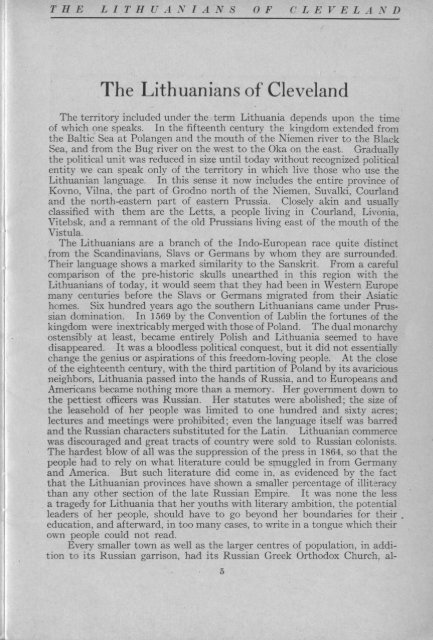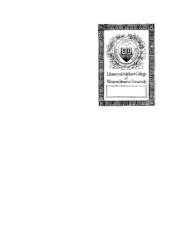The Lithuanians of Cleveland
The Lithuanians of Cleveland
The Lithuanians of Cleveland
You also want an ePaper? Increase the reach of your titles
YUMPU automatically turns print PDFs into web optimized ePapers that Google loves.
THE LITHUA.VIANS OF C LEV E L .1 N D<br />
<strong>The</strong> <strong>Lithuanians</strong> <strong>of</strong> <strong>Cleveland</strong><br />
<strong>The</strong> territory included under the term Lithuania depends upon the time<br />
<strong>of</strong> which one speaks. In the fifteenth century the kingdom extended from<br />
the Baltic Sea at Polangen and the mouth <strong>of</strong> the Niemen river to the Black<br />
Sea, and from the Bug river on the west to the Oka on the east. Gradually<br />
the political unit was reduced in size until today without recognized political<br />
entity we can speak only <strong>of</strong> the territory in which live those who use the<br />
Lithuanian language. In this sense it now includes the entire province <strong>of</strong><br />
Kovno, Vilna, the part <strong>of</strong> Grodno north <strong>of</strong> the Niemen, Suvalki, Courland<br />
and the north-eastern part <strong>of</strong> eastern Prussia. Closely akin and usually<br />
classified with them are the Letts, a people living in Courland, Livonia,<br />
Vitebsk, and a remnant <strong>of</strong> the old Prussians living east <strong>of</strong> the mouth <strong>of</strong> the<br />
Vistula.<br />
<strong>The</strong> <strong>Lithuanians</strong> are a branch <strong>of</strong> the Indo-European race quite distinct<br />
from the Scandinavians, Slavs or Germans by whom they are surrounded.<br />
<strong>The</strong>ir language shows a marked similarity to the Sanskrit. From a careful<br />
comparison <strong>of</strong> the pre-historic skulls unearthed in this region with the<br />
<strong>Lithuanians</strong> <strong>of</strong> today, it would seem that they had been in Western Europe<br />
many centuries before the Slavs or Germans migrated from their Asiatic<br />
homes. Six hundred years ago the southern <strong>Lithuanians</strong> came under Prussian<br />
domination. In 1569 by the Convention <strong>of</strong> Lublin the fortunes <strong>of</strong> the<br />
kingdom were inextricably merged with those <strong>of</strong> Poland. <strong>The</strong> dual monarchy<br />
ostensibly at least, became entirely Polish and Lithuania seemed to have<br />
disappeared. It was a bloodless political conquest, but it did not essentially<br />
change the genius or aspirations <strong>of</strong> this freedom-loving people. At the close<br />
<strong>of</strong> the eighteenth century, with the third partition <strong>of</strong> Poland by its avaricious<br />
neighbors, Lithuania passed into the hands <strong>of</strong> Russia, and to Europeans and<br />
Americans became nothing more than a memory. Her government down to<br />
the pettiest <strong>of</strong>ficers was Russian. Her statutes were abolished; the size <strong>of</strong><br />
the leasehold <strong>of</strong> her people was limited to one hundred and sixty acres;<br />
lectures and meetings were prohibited; even the language itself was barred<br />
and the Russian characters substituted for the Latin. Lithuanian commerce<br />
was discouraged and great tracts <strong>of</strong> country were sold to Russian colonists.<br />
<strong>The</strong> hardest blow <strong>of</strong> all was the suppression <strong>of</strong> the press in 1864, so that the<br />
people had to rely on what literature could be smuggled in from Germany<br />
and America. But such literature did come in, as evidenced by the fact<br />
that the Lithuanian provinces have shown a smaller percentage <strong>of</strong> illiteracy<br />
than any other section <strong>of</strong> the late Russian Empire. It was none the less<br />
a tragedy for Lithuania that her youths with literary ambition, the potential<br />
leaders <strong>of</strong> her people, should have to go beyond her boundaries for their .<br />
education, and afterward, in too many cases, to write in a tongue which their<br />
own people could not read.<br />
Every smaller town as well as the larger centres <strong>of</strong> popUlation, in addition<br />
to its Russian garrison, had its Russian Greek Orthodox Church, al-<br />
5

















